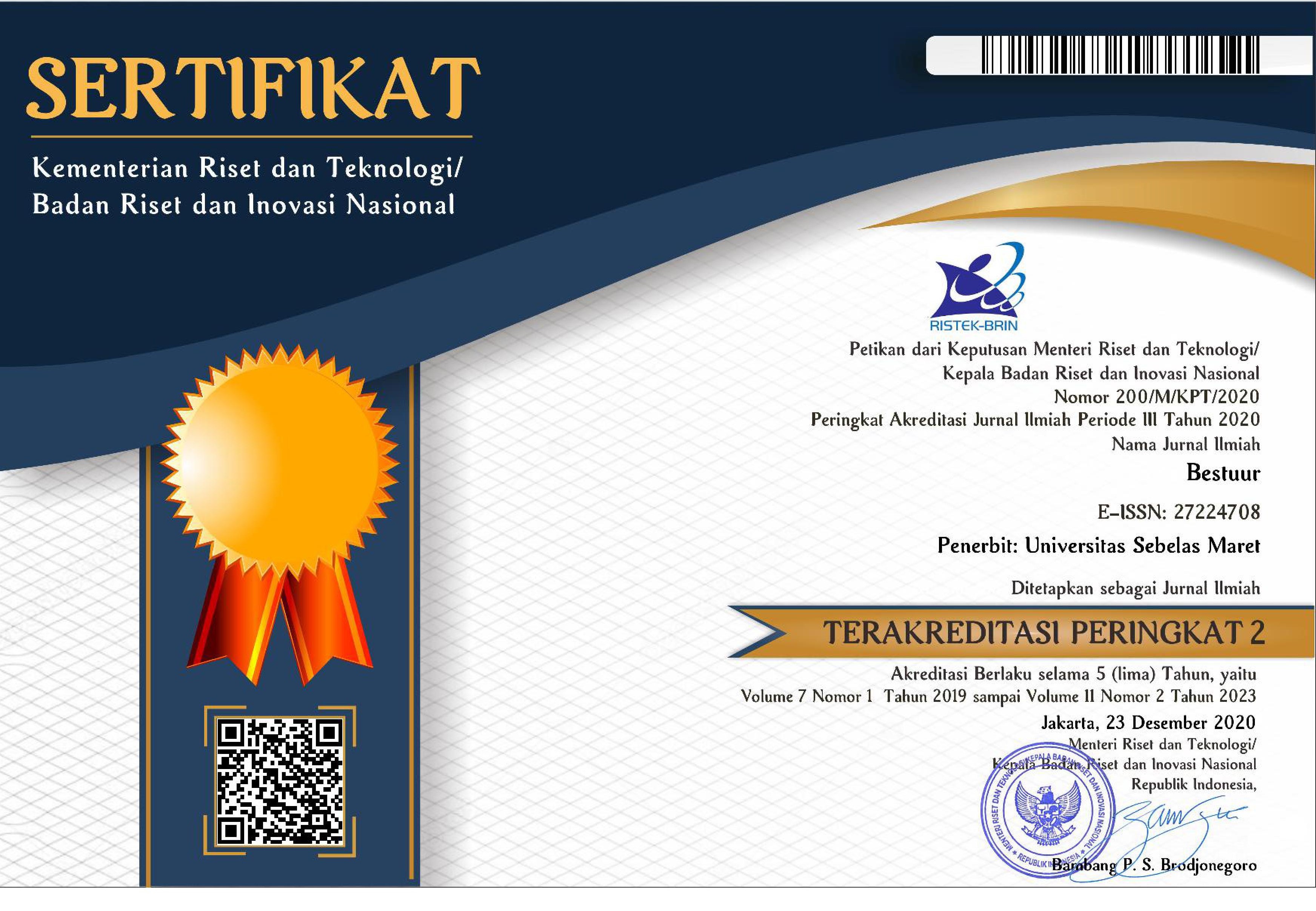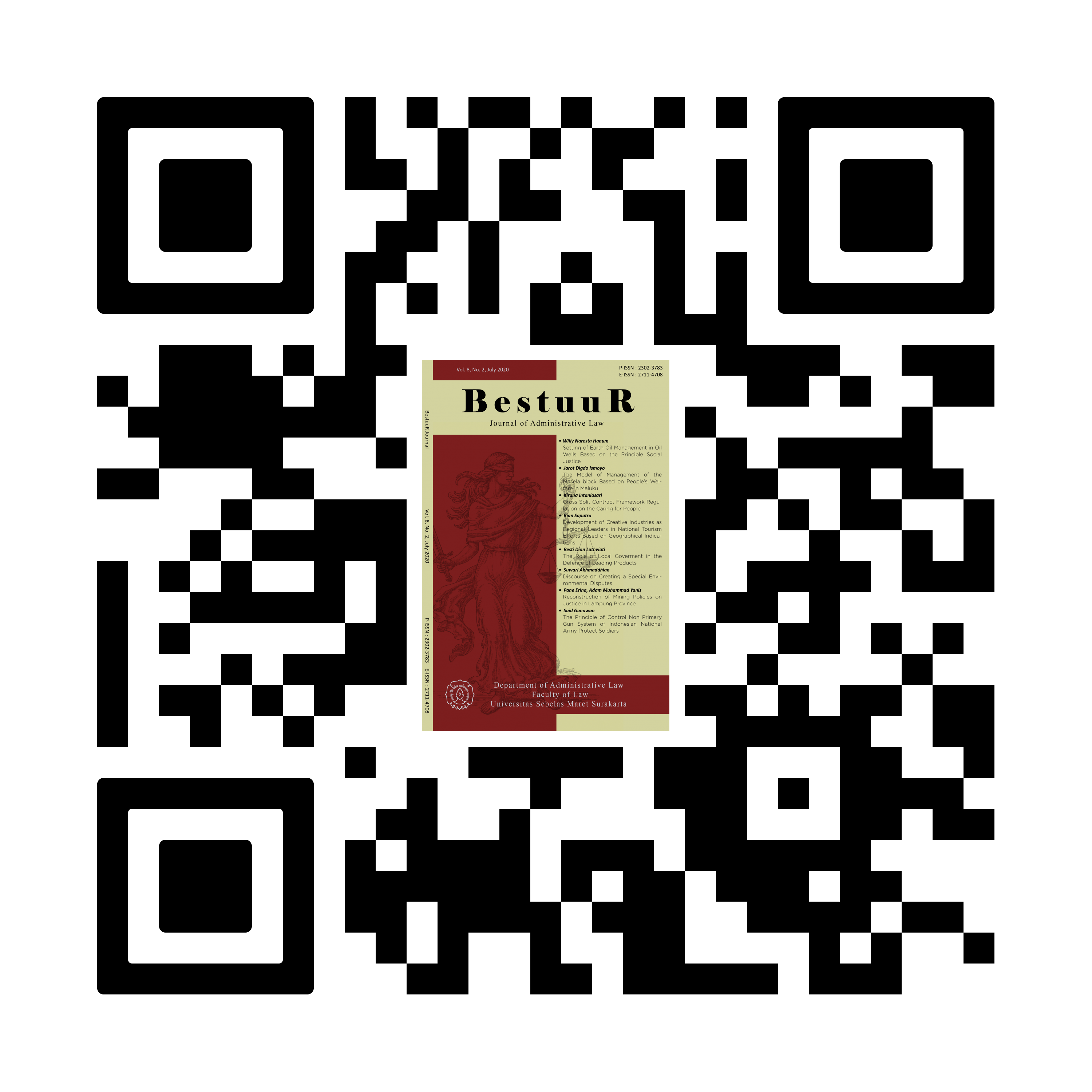The Implementation of Labor Development Principles According to Job Creation Law as a Reason to Protect Wages Rights
Abstract
Wage is a fundamental right of labor. Since the passage of the Job Creation Law, the wage policy has changed. In order to aid national development, the wage is ruled to be distributed following the principle of job creation. Instead of bringing peace, that change has led to public criticism towards the Job Creation Law, which is deemed to injure labor rights. This study aims to analyze the legal protection and the implementation of labor development principles in the Job Creation Law. This study is normative legal research and applies a juridical approach. The primary data were obtained from the regulation analysis, while the secondary data were collected from a literature review regarding wage rights. This research reveals that the legal protection of wages in the new regulation is not far better than the previous law. The wage policies initially stipulated explicitly in the Labor Law were revoked from the Job Creation Law, where the labor principles are not applied. By the protection not better than that of the former regulation, it is implausible to improve the welfare of workers and their family members.
Keywords
Full Text:
PDFReferences
Alaniz, E., Gindling, T., Mata, C., & Rojas, D. (2020). Transforming informal work and livelihoods in Costa Rica and Nicaragua (Issue 2020/100). The United Nations University World Institute for Development Economics Research (UNU-WIDER). https://doi.org/10.35188/UNU-WIDER/2020/857-3
Aprilia, I. S., & Gunadi, A. (2021). The Bankruptcy Aspect in Single Shareholder Company After Indonesian Job-Creation Act. Proceedings of the International Conference on Economics, Business, Social, and Humanities (ICEBSH 2021), 570(Icebsh), 1490–1493. https://doi.org/10.2991/assehr.k.210805.235
Arifin, S. (2021). Illiberal tendencies in Indonesian legislation: the case of the omnibus law on job creation. The Theory and Practice of Legislation, 1–18. https://doi.org/10.1080/20508840.2021.1942374
Arumbinang, M. H. (2021). Tripulación Indonesia de trabajos forzados en un buque Chino : una perspectiva de derechos humanos Indonesian Forced-Labour Crew in Chinese Vessel : A Human Rights Perspective. 2, 115–133, available at: Google Scholar.
Asuan, A. (2019). Perlindungan Hukum Terhadap Pekerja Berstatus Perjanjian Kerja Waktu Tertentu (Pkwt) Menurut Undang-Undang Nomor 13 Tahun 2003 Tentang Ketenagakerjaan. Solusi, 17(1), 23–31. https://doi.org/10.36546/solusi.v17i1.147
Biermann, F., & Kalfagianni, A. (2020). Planetary justice: A research framework. Earth System Governance, 6, 100049. https://doi.org/10.1016/j.esg.2020.100049
Charda S., U. (2016). Karakteristik Undang-Undang Ketenagakerjaan Dalam Perlindungan Hukum Terhadap Tenaga Kerja. Jurnal Wawasan Yuridika, 32(1), 1. https://doi.org/10.25072/jwy.v32i1.86
Christiani, T. A. (2016). Normative and Empirical Research Methods: Their Usefulness and Relevance in the Study of Law as an Object. Procedia - Social and Behavioral Sciences, 219, 201–207. https://doi.org/10.1016/j.sbspro.2016.05.006
Cui, C., John, K., Pang, J., & Wu, H. (2018). Employment protection and corporate cash holdings: Evidence from China’s labor contract law. Journal of Banking & Finance, 92, 182–194. https://doi.org/10.1016/j.jbankfin.2018.05.011
Djakaria, M. (2018). Perlindungan Hukum bagi Pekerja Wnaita untuk Memperoleh Hak-Hak Pekerja DIkaitkan dengan Kesehatan Reproduksi. Jurnal Bina Mulia Hukum, 3(1), 1–14. https://doi.org/10.23920/jbmh.v3n1.2
Gaffar, S., Karsona, A. M., Pujiwati, Y., & Perwira, I. (2021). The concept of procedural law regarding the implementation of collective agreements with legal certainty in termination of employment in Indonesia. Heliyon, 7(4), e06690. https://doi.org/10.1016/j.heliyon.2021.e06690
Hamid, A. (2020). Analysis of The Importance of Omnibus Law “Cipta Karya" in Indonesia. International Journal of Scientific Research and Management, 8(08), 236–250. https://doi.org/10.18535/ijsrm/v8i08.lla01
Hill, H. D., & Romich, J. (2018). How Will Higher Minimum Wages Affect Family Life and Children’s Well-Being? Child Development Perspectives, 12(2), 109–114. https://doi.org/10.1111/cdep.12270
Jiang, J., & Chen, Y. (2021). How does labor protection influence corporate risk-taking? Evidence from China. Pacific-Basin Finance Journal, 68, 101572. https://doi.org/10.1016/j.pacfin.2021.101572
MaCurdy, T. (2015). How effective is the minimum wage at supporting the poor? Journal of Political Economy, 123(2), 497–545. https://doi.org/10.1086/679626
Mahasin, Z. Z., Naziah, F., & Arifin, R. (2020). Wage Problems in Indonesia in the Human Rights Perspective (Case of Inappropriate Wages for Pot Workers in Tangerang). The Indonesian Journal of International Clinical Legal Education, 2(1), 1–14. https://doi.org/10.15294/ijicle.v2i1.37326
Mahy, P. (2021). Indonesia’s Omnibus Law on Job Creation: Reducing Labour Protections in a Time of COVID-19. SSRN Electronic Journal, 23, 1–23. https://doi.org/10.2139/ssrn.3772526
Nai’em, M. F., Darwis, A. M., & Maksun, S. S. (2021). Trend analysis and projection of work accidents cases based on work shifts, workers age, and accident types. Gaceta Sanitaria, 35, S94–S97. https://doi.org/10.1016/j.gaceta.2020.12.026
Ries, N. M., Mansfield, E., & Sanson-Fisher, R. (2020). Ethical and legal aspects of research involving older people with cognitive impairment: A survey of dementia researchers in Australia. International Journal of Law and Psychiatry, 68, 101534. https://doi.org/10.1016/j.ijlp.2019.101534
Saptono, P. B., & Ayudia, C. (2021). Income Tax Issues on the Omnibus Law and Its Implications in Indonesia. AKRUAL: Jurnal Akuntansi, 12(2), 164. https://doi.org/10.26740/jaj.v12n2.p164-178
Widyaningrum, H. (2018). Pencegahan Terhadap Pelanggaran Hak Perempuan Sebagai Pekerja Berdasarkan Undang-Undang Nomor 13 Tahun 2003. Krtha Bhayangkara, 12(2), 229–240. https://doi.org/10.31599/krtha.v12i2.27
Yin, M., & Techera, E. J. (2020). A critical analysis of marine protected area legislation across state and territory jurisdictions in Australia. Marine Policy, 118, 104019. https://doi.org/10.1016/j.marpol.2020.104019
Zhang, H., Lou, Y., & Cai, K. (2021). Research on the dilemma and improvement of legal regulation for unfair competition related to corporate data in China. Computer Law & Security Review, 42, 105582. https://doi.org/10.1016/j.clsr.2021.105582
DOI: https://doi.org/10.20961/bestuur.v9i1.49252
Refbacks
- There are currently no refbacks.
Copyright (c) 2021 Nur Putri Hidayah, Quincy R. Cloet, David Pradhan
License URL: https://creativecommons.org/licenses/by/4.0/
|











_CROSREF.jpg)




